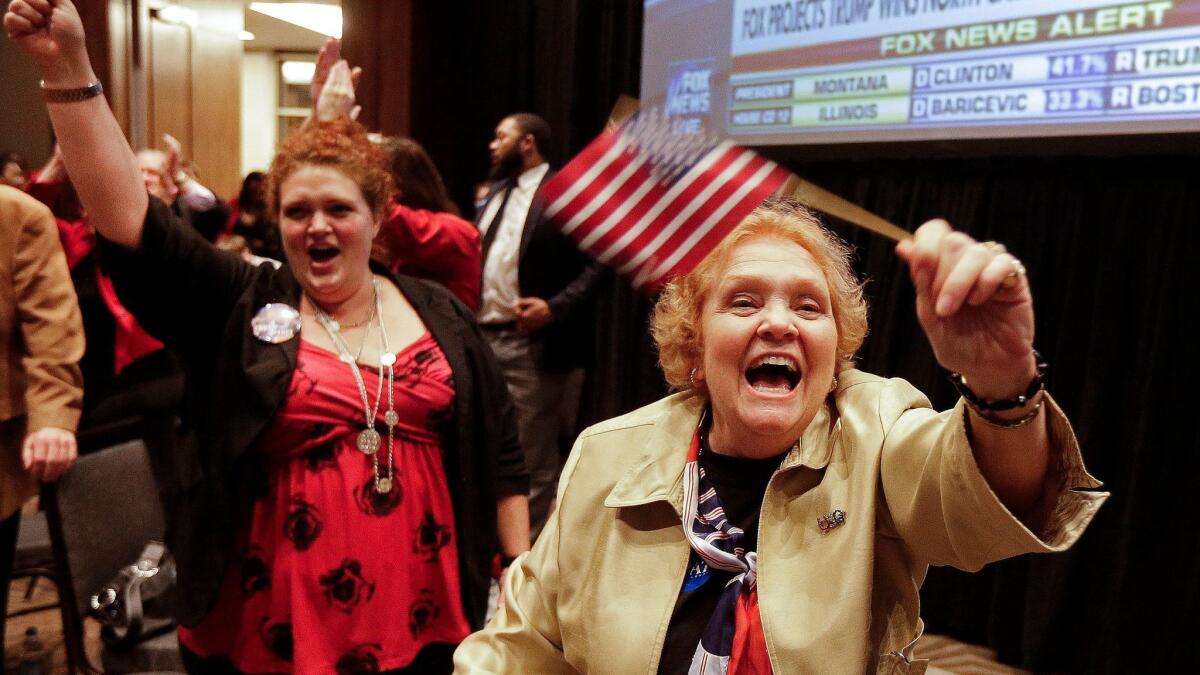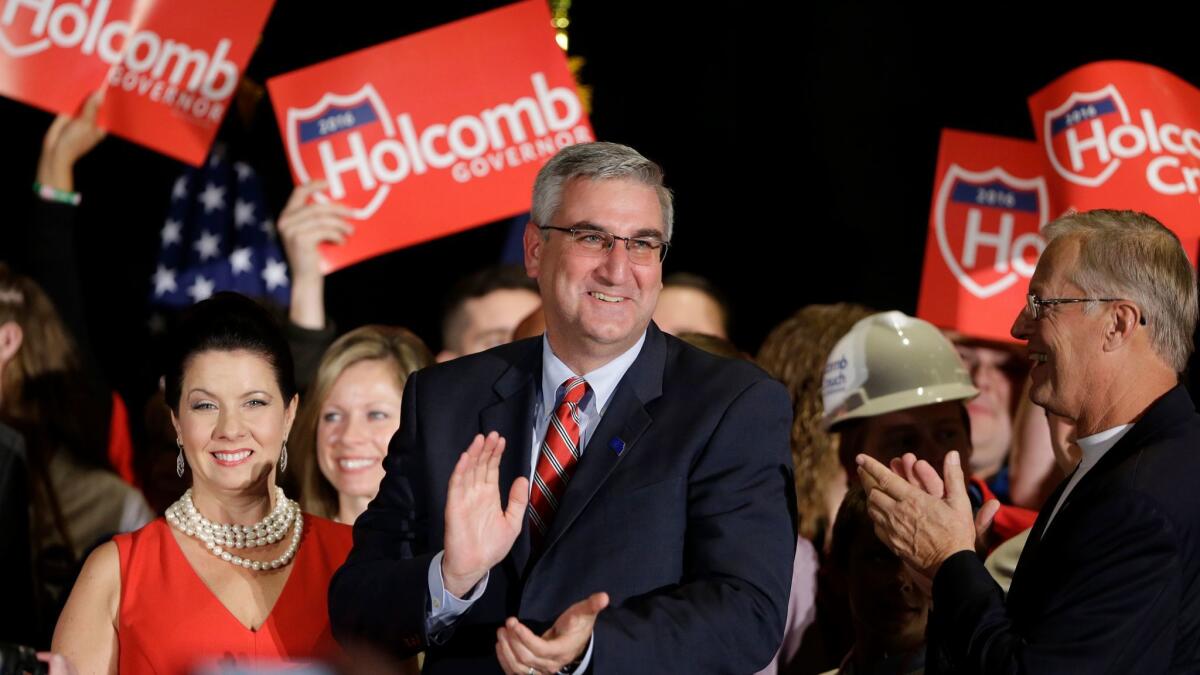Democratic challenger holds slim lead in North Carolina governor’s race, but GOP makes gains elsewhere

Reporting from Charlotte, N.C. — A Democratic challenger held a razor-thin lead over Republican Gov. Pat McCrory of North Carolina early Wednesday in a hard-fought, high-profile governor’s race, one of several around the country on a night that mostly favored the GOP.
With virtually all precincts reporting, state Atty. Gen. Roy Cooper led McCrory by roughly 4,000 votes out of more than 4 million cast.
With 12 governorships up for grabs, Republicans maintained control of four of those chief executive seats and picked off two Democratic ones, while Democrats held onto three in the initial races counted.
Even with five contests still in play, Republicans retained gubernatorial dominance nationwide. Democrats had gone into the contest holding 18 governorships to Republicans’ 32.
North Carolina was a prime battlefield, with backing for McCrory reflecting the rightward swing that also helped propel presidential candidate Donald Trump to victory in the state.
McCrory had calculated that supporting House Bill 2, the state’s contentious law that restricts transgender bathroom access, would shore up his Republican base.
Yet the new law swiftly became so unpopular, generating economic boycotts and prompting sports leagues such as the NBA to pull championship events from the state, that McCrory found himself entrenched in one of closest gubernatorial races in the nation, struggling in his bid for reelection against Cooper, a Democrat who has served as attorney general since 2001.
Many independent voters in the bustling, modern Southern city of Charlotte — and even some who typically vote Republican — said Tuesday that they had been dismayed by the governor’s strident backing of HB2 and were concerned about the law’s negative impact on the state’s reputation.
As McCrory looked like he might just pull the election on Tuesday night, many opponents of the law were left feeling deflated.
“I feel like I’m going back to the stone age as far as North Carolina is concerned,” said Derrick Roddey, 50, a gay Democrat who works as a sales coordinator for Charlotte hotels. Roddey once voted for McCrory for Mayor, yet is deeply opposed to his stance on House Bill 2.
“It’s discriminatory,” he said of HB2 late Tuesday night at a Democratic election night party in Charlotte. “I feel like he shouldn’t be in office.”
But Jamie Crump, 36, a mechanic who lives in Iron Station, about 25 miles northwest of Charlotte, said he voted for McCrory because he thought he had brought jobs to the state. Asked if HB2 played a role in his vote, he said he thought McCrory’s judgment on that law was sound.
“I’ve just liked the things he has done for our state,” he said. “And I don’t think it’s right for a man to dress up as a woman and go into a bathroom with my wife or my daughter.”
While McCrory was generally unpopular in the state’s urban and suburban areas, his vigorous leadership in the wake of Hurricane Matthew, which brought record flooding to some parts of the state, revitalized his fortunes and brought the race to “coin toss status,” said J. Michael Bitzer, a professor of political science at Catawba College in Salisbury, N.C.
In the governor’s race in Vermont, voters switched the state into the GOP column. Republican Lt. Gov. Phil Scott bested Democrat Sue Minter, the former state transportation secretary. Although the state is traditionally Democratic-leaning, it sometimes supports candidates who are fiscally conservative but socially liberal.
The previously Democratic governorship of Missouri also passed into Republican hands, with Democratic state Atty. Gen. Chris Koster losing out to Eric Greitens, a onetime Navy SEAL who served in Iraq and Afghanistan.
In Indiana, GOP Lt. Gov. Eric Holcomb emerged victorious, having stepped in after fellow Republican Gov. Mike Pence joined Trump’s national ticket. Holcomb defeated Democrat John Gregg, the state House Speaker who had lost the gubernatorial race in 2012 to Pence.

Polls had initially put Gregg ahead of Holcomb, but the race tightened in the final days.
Democrat Jim Justice won the gubernatorial race in West Virginia — but the billionaire coal executive had emphatically distanced himself from Hillary Clinton. Republicans had hoped that their nominee Bill Cole, president of the state Senate, would reap the benefit of Donald Trump’s overall win in the state.
Several races were considered all but locked up in advance of the vote. In Delaware, Democratic U.S. Rep. John Carney easily held off his Republican rival, state Sen. Colin Bonini.
In North Dakota, where the Democrats have not held the governorship since 1992, Republican businessman Doug Burgum bested Democrat Marvin Nelson. And in Utah, Republican Gary Herbert was reelected, despite misgivings among the state’s conservative base about Trump’s candidacy.
In Oregon, Democratic Gov. Kate Brown defeated her GOP opponent, Bud Pierce.
While attention in this tempestuous year focused on the presidential contest, the races for governor can help shape future electoral contests, because control of the statehouse translates into power over the redrawing of legislative districts. And substantial day-to-day governance takes place at the state level.
In New Hampshire, Republican Chris Sununu was elected governor.
Special correspondent Jarvie reported from Charlotte and Times staff writer King from Washington.
Twitter: @LauraKingLAT
UPDATES:
3:10 a.m. Nov. 9: This article was updated with a GOP victory in New Hampshire.
11:00 p.m.: Updates with latest results in North Carolina, GOP victory in Missouri.
This article was originally posted at 8 p.m. Nov. 8.
More to Read
Get the L.A. Times Politics newsletter
Deeply reported insights into legislation, politics and policy from Sacramento, Washington and beyond. In your inbox three times per week.
You may occasionally receive promotional content from the Los Angeles Times.











